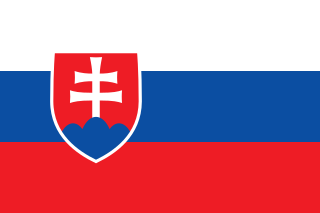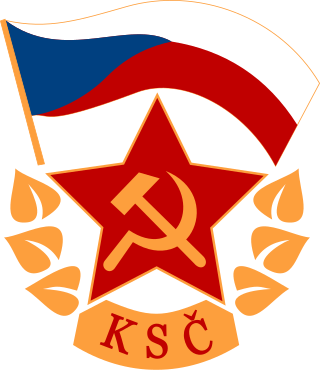
Czechoslovakia was a landlocked country in Central Europe, created in 1918, when it declared its independence from Austria-Hungary. In 1938, after the Munich Agreement, the Sudetenland became part of Nazi Germany, while the country lost further territories to Hungary and Poland. Between 1939 and 1945, the state ceased to exist, as Slovakia proclaimed its independence and Carpathian Ruthenia became part of Hungary, while the German Protectorate of Bohemia and Moravia was proclaimed in the remainder of the Czech Lands. In 1939, after the outbreak of World War II, former Czechoslovak President Edvard Beneš formed a government-in-exile and sought recognition from the Allies.

Slovakia, officially the Slovak Republic, is a landlocked country in Central Europe. It is bordered by Poland to the north, Ukraine to the east, Hungary to the south, Austria to the west, and the Czech Republic to the northwest. Slovakia's mostly mountainous territory spans about 49,000 km2 (19,000 sq mi), hosting a population exceeding 5.4 million. The capital and largest city is Bratislava, while the second largest city is Košice.

The Third Czechoslovak Republic, officially the Czechoslovak Republic, was a sovereign state from April 1945 to February 1948 following the end of World War II.

The Communist Party of Czechoslovakia was a communist and Marxist–Leninist political party in Czechoslovakia that existed between 1921 and 1992. It was a member of the Comintern. Between 1929 and 1953, it was led by Klement Gottwald. The KSČ was the sole governing party in the Czechoslovak Socialist Republic though it was a leading party along with the Slovak branch and four other legally permitted non-communist parties. After its election victory in 1946, it seized power in the 1948 Czechoslovak coup d'état and established a one-party state allied with the Soviet Union. Nationalization of virtually all private enterprises followed, and a command economy was implemented.
With the collapse of the Austria-Hungary at the end of World War I, the independent country of Czechoslovakia was formed as a result of the critical intervention of U.S. President Woodrow Wilson, among others.

Gustáv Husák was a Czechoslovak politician who served as the long-time First Secretary of the Communist Party of Czechoslovakia from 1969 to 1987 and the President of Czechoslovakia from 1975 to 1989.

The National Council of the Slovak Republic is the national parliament of Slovakia. It is unicameral and consists of 150 members, who are elected by universal suffrage under proportional representation with seats distributed via largest remainder method with Hagenbach-Bischoff quota every four years.

Czech National Social Party is a nationalist political party in the Czech Republic, that played an important role in Czechoslovakia during the interwar period. It was established in 1897 by break-away groups from both the national liberal Young Czech Party and the Czech Social Democratic Party, with a stress on achieving independence of the Czech lands from Austria-Hungary. Its variant of socialism was moderate and reformist rather than a Marxist one. After the National Labour Party dissolved and merged with National Socialists in 1930, the party also became the refuge for Czech liberals. Its best-known member was Edvard Beneš, a co-founder of Czechoslovakia and the country's second President during the 1930s and 1940s.
This article is intended to give an overview of liberalism in Slovakia.
There are five types of elections in Slovakia: municipal elections, regional elections, parliamentary elections, presidential elections and elections to the European Parliament. All four types of elections are normally held after fixed periods, although early elections can occur in certain situations. Elections are conventionally scheduled for a Saturday - the polls normally open at 7:00 in the morning and close at 22:00 in the evening. Citizens aged 18 years or older are eligible to vote. Those serving prison sentences for particularly serious crimes, as well as those deprived of legal capacity, including persons with mental disabilities, are denied the right to vote. Voter registration is passive and decentralized with the voter register maintained by municipalities based on the permanent residence register. Voter lists are updated continuously based on municipal records and input provided by state institutions or other municipalities. Voters may verify their data in voter lists, and, if necessary, request correction until the day before election day. On election day, a voter can be added to a voter list upon presenting an identity card with proof of residency. Some 4.4 million voters are registered and valid to vote in the elections. Voters are only able to vote from abroad during the Parliamentary Elections in Slovakia.

The Czechoslovak Socialist Republic, known from 1948 to 1960 as the Czechoslovak Republic, Fourth Czechoslovak Republic, or simply Czechoslovakia, was the Czechoslovak state from 1948 until 1989, when the country was under communist rule, and was regarded as a satellite state in the Soviet sphere of interest.

The Beneš decrees were a series of laws drafted by the Czechoslovak government-in-exile in the absence of the Czechoslovak parliament during the German occupation of Czechoslovakia in World War II. They were issued by President Edvard Beneš from 21 July 1940 to 27 October 1945 and retroactively ratified by the Interim National Assembly of Czechoslovakia on 6 March 1946.
The Democratic Party was a political party in Slovakia, active between 1989 and 2006.
Parliamentary elections were held in Czechoslovakia on 26 May 1946. The Communist Party of Czechoslovakia emerged as the largest party, winning 114 of the 300 seats with 38% of the vote. The Communist vote share was higher than any party had ever achieved in a Czechoslovak parliamentary election; previously, no party had ever won more than 25%. Voter turnout was 94%. The national results also determined the composition of the Slovak National Council and local committees.

Magdaléna Vášáryová is a Slovak actress and diplomat, prominent for her liberal anti-nationalist stances.

Slovakization or Slovakisation is a form of either forced or voluntary cultural assimilation and acculturation, during which non-Slovak nationals give up their culture and language in favor of the Slovak one. This process has relied most heavily on intimidation and harassment by state authorities. Another method of Slovakization was artificial resettlement. In the past the process has been greatly aided by deprivation of collective rights for minorities and ethnic cleansing, but in the last decades its promotion has been limited to the adoption of anti-minority policies and anti-minority hate speech.

Šarišská Trstená is a village and municipality in Prešov District in the Prešov Region of eastern Slovakia.

In Czechoslovakia the first parliamentary elections to the National Assembly were held in 1920, two years after the country came into existence. They followed the adoption of the 1920 constitution. Prior to the elections, a legislature had been formed under the name Revolutionary National Assembly, composed of the Czech deputies elected in 1911 in Cisleithania, Slovak deputies elected in Hungary in 1910 and other co-opted deputies.

Mátraszentimre is a village in Heves County, Hungary, in the Mátra mountain range, between the Darázs, Teréz and Nagy-Átal-kő mountains. The Galya-tető peak is inside of the village territory, east from the center. As of 2022 census, it has a population of 455. The village located 17.5 km from Hatvan–Fiľakovo railway line, 21.9 km from the main road 21 and 38.0 km from the M3 motorway. The Mátraszőlős-Hasznos railway stop is the closest on the Hatvan–Fiľakovo railway line, and 7.8 km from the village is the Szalajkaház terminus of the Mátravasút, which is a narrow-gauge railway to Gyöngyös for tourist.

The Democratic Party was a conservative political party in Slovakia, existing during the final phase of World War II and the Third Czechoslovak Republic, from 1944 to 1948.














